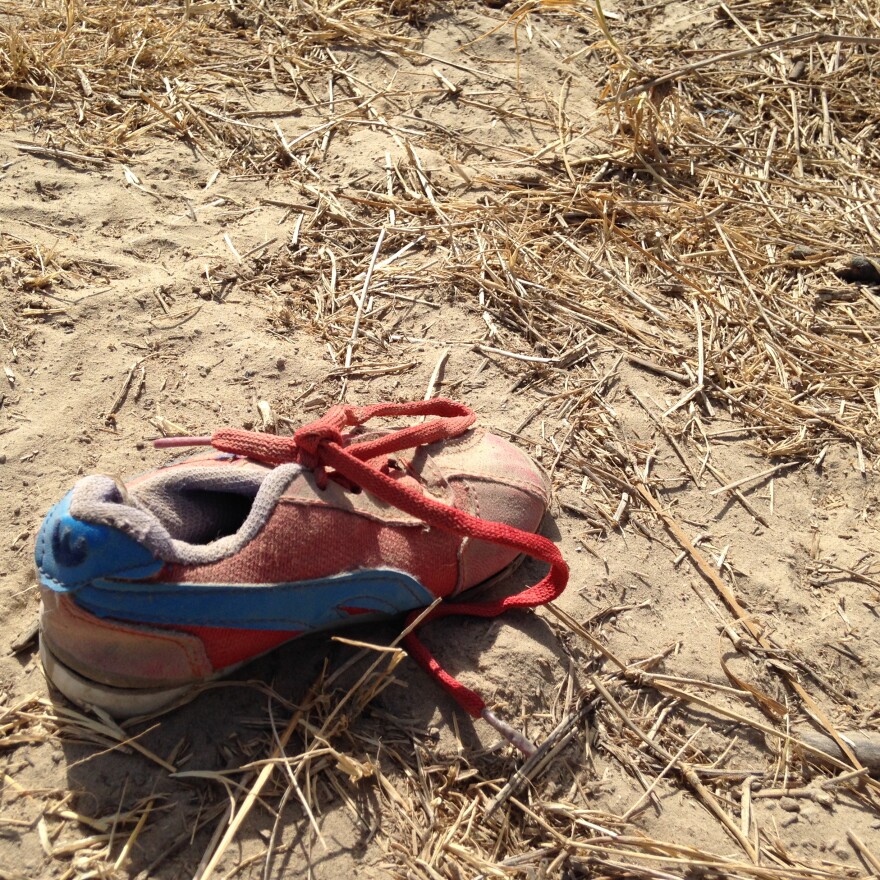NEAR HIDALGO, Texas —People in South Texas are still catching their breath after the recent surge of illegal border crossers from Central America. That sudden spike has declined significantly since the peak of summer.
Cicadas hummed and giant reeds rustled at the banks of the Rio Grande. The faint jabber of a loudspeaker echoed from a nearby Mexican village known as a staging ground for migrants headed north. Below, a trail cut through the thick brush on both sides of the river bank, evidence of human movement.
"This area where we are right now there's a lot of high traffic," said U.S. Border Patrol Agent Joe Gutierrez.
He pointed to piles of trash left behind by immigrants. Toothbrushes, life vests, water bottles, and an infant's sneaker rested on the sand. Things were quiet in the midday August heat.
"It's slowed down recently due to the heat," Gutierrez said. "Whenever these summer months come along, that translates to less people."
A mother and daughter leave a government run migrant shelter in the Mexican border city of Reynosa.
The quiet was suddenly interrupted by a group of state troopers patrolling on ATVs. They're part of a law enforcement surge ordered by the Texas Gov. Rick Perry. They're also a reminder that, despite the slowdown, this section of the border is still the busiest in the nation.
At a feed store less than a mile from the border in Rio Grande City, an employee scooped birdseed onto a scale. Assistant Manager Jorge Martinez recalled how often he would see immigrants cut past the store these past months.
"Sometimes we can count like 15, 20, like every like two hours, three hours," he said. "Little babies, old ladies, young men. It was bad."
In June the U.S. Border Patrol caught more than 10,600 children traveling alone along the southern border. By the end of July only about half that many had been apprehended. The numbers continued to drop in August.
Toys and toiletries left behind by migrants moving across the banks of the Rio Grande River near Hidalgo, Texas.
Adam Isacson with the Washington Office on Latin America — a social justice advocacy organization — thinks there's more to the decline than just the summer heat. For example, efforts by the U.S. government to stop rumors that Central Americans can get a "free pass" into the country.
"The U.S. funded ad campaign encouraging people not to come was having some impact because apparently one song that was written as sort of a jingle for one of these ads became a radio hit," Isacson said. "People were requesting it because it was so catchy."
The song is called "La Bestia," or the Beast. It's the nickname given to the train Central American migrants use to hitchhike across Mexico. The song compares migrants to cattle on their way to the slaughter house riding a steel serpent.
Yet, other than the popularity of the song, there are no hard numbers to prove that the U.S. campaign is having a significant impact.
Isacson said the United States has also been pressuring Mexico to clamp down on illegal immigration.
"Mexico has really reduced the number of people who can take cargo trains and come northward," he said. "And there's been a big increase in patrols and sweeps and road checkpoints. That itself may be reducing the arrivals of some Central Americans."
Inside the kitchen of a government shelter in the Mexican border city of Reynosa, young migrants ladled ruby-colored punch into plastic cups. These teenage boys from El Salvador and Guatemala were caught by Mexican authorities before they could reach the United States. Now they'll be sent home.
Esveraldo, 15, said he did hear Guatemalan news reports that the U.S. was deporting migrant kids. Still, his family agreed to pay a smuggler $4,500 to take him north.
The international bridge that connects Hidalgo, Texas to Reynosa, Tamaulipas. The number of unaccompanied children trying to cross the border illegally in this area has decreased.
He was going to New York City to meet his dad for the first time. Near the U.S. border he spent two weeks sleeping on the floor of a warehouse waiting for an ideal time to cross. He said his smugglers only fed him once a day.
"When I get back to Guatemala, I'll think about [whether to try again]," he said.
Meanwhile border residents can expect illegal immigration to pick up again as the weather cools. Just how strong that pickup will be is unclear.





